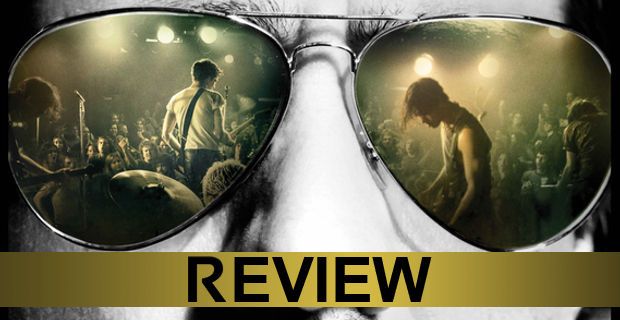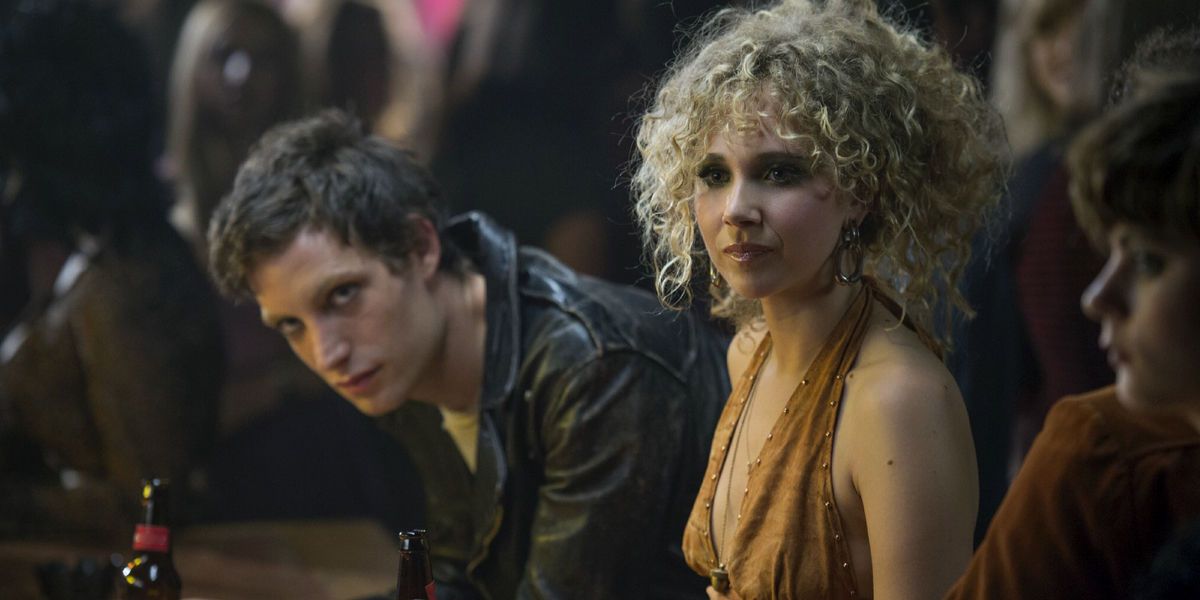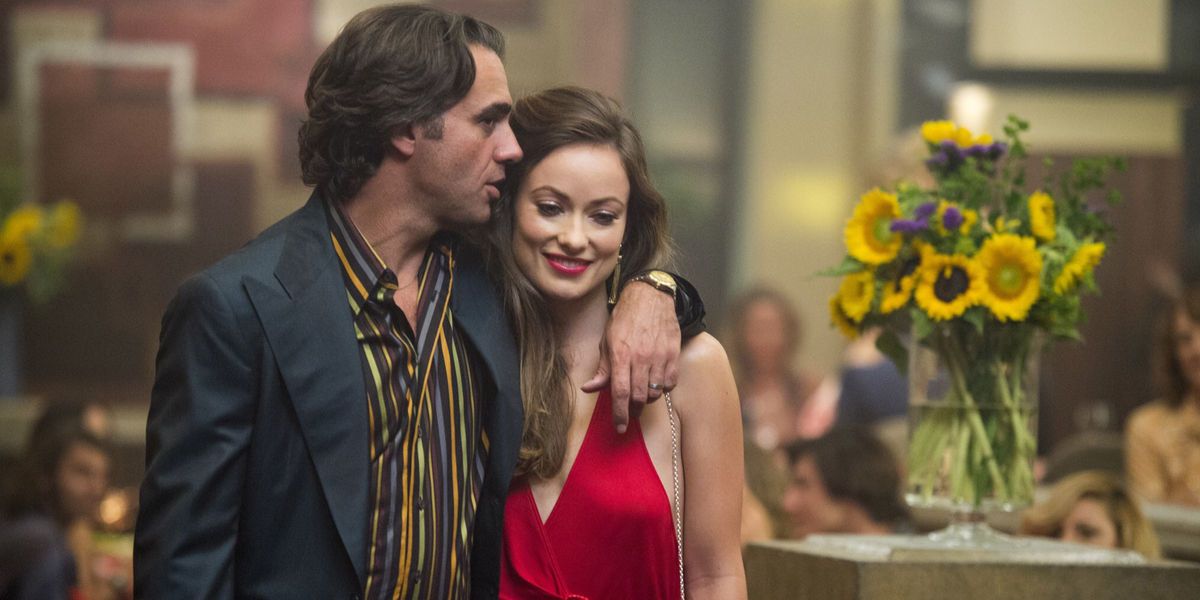[This is a review of the Vinyl series premiere. There will be SPOILERS.]
-
From the opening scene on, Vinyl is all controlled chaos. This is a show set in and around the music industry, and as a result, that music is loud and omnipresent; it's pitch perfect – almost too perfect, actually – and the set list is comprised suspiciously of "the hits." Amongst all the lines of coke snorted off rear-view mirrors and various other surfaces, the frenzied pilot is filled with musical interludes that play like fever dreams set against a backdrop of flashing lights and smoke, adding to the infectious theatricality of it all. But at the same time, those elements obfuscate a detail that becomes clearer once the series extricates itself from the figurative rubble of Martin Scorsese's near-perfect house-razing directorial effort, setting an impossibly high standard for the continuing and mostly derivative story of Bobby Cannavale's Richie Finestra and his struggling record label.
Bringing in America's greatest living director to kick off the next "must-see" television series (co-created by Scorsese, rock legend Mick Jagger, Terence Winter, and Rich Cohen) that boasts a phenomenal cast and more musical cues than you can shake a tambourine at is a tricky proposition. It creates a familiar scenario, one seen when Scorsese stepped in to direct the pilot episode of Winter's 1920s prohibition drama, Boardwalk Empire. After Scorsese shepherded the lavish period piece into existence, Empire, like Vinyl, was put in Winter's hands as showrunner, and as is the case with most television series, several other well-respected directors. The series had its own distinct look and feel – established primarily through the efforts of pilot – and yet, no matter who was brought in to handle episodes through to the series' end, it never quite reached the same highs as the premiere.
Maybe it's the music, maybe it's the drugs, maybe it's the time period and setting – it's likely a combination of them all – but there's something about Vinyl that, without Scorsese, becomes noticeably more diluted than a Scorsese-less Boardwalk Empire. In this case, though, because what Scorsese delivers in these first two hours is so energetic and entertaining there's a pervasive sense the rest of the season may feel a little like local cover bands obligated to play someone else's song, instead of trying out some of their own material.
As engaging (visually and otherwise) as Vinyl's first two hours are, the notion that the series is "just playing the hits" or covering "the same old song" is virtually inescapable. Tucked away inside the blazing-hot pilot is the revelation that Vinyl is just another story of a middle-aged white guy who must quest to find himself amidst all his happiness and wealth. The series seems poised to tell a story TV should have outgrown five years ago. And yet, the first two hours are so much fun, so wildly entertaining and well made that it's easy to overlook the series can sometimes feel like a hollow, coked-up cover of Mad Men. Here, Richie Finestra is Don Draper with the volume turned up to eleven – those quiet, contemplative moments of the laconic ad man are replaced with explosive outbursts and, in one instance, an act of bloody murder that involves a dazzlingly abrasive performance from Andrew Dice Clay.
The series' flirtation with familiarity doesn't end there. Despite having a phenomenal cast that includes the aforementioned Cannavale, along with Olivia Wilde, Juno Temple, Max Casella, and Ray Romano, the script – from Winter and George Mastras – is the black t-shirt-wearing security occupying the stage's periphery. It never obstructs anyone's view of the artist onstage, but it makes sure those watching remain at a safe distance from the talent. Amidst the chaos of Richie selling his record company, trying to secure Led Zeppelin, and the guilt-ridden flashbacks to his time managing would-be blues musician Lester Grimes (Ato Essandoh), there is a noticeable dearth of… let's call it a human element. Like Boardwalk Empire and, to a certain degree, The Wolf of Wall Street, the script for Vinyl can be entertaining, but it is so fixated on answering the question of how well any given scene services the baseline concept of the series, it sidesteps anything that might make the in-the-moment experiences translate into a larger idea or emotion. The fixation on the coke-dusted surface of the '70s delivers specificity in its setting, but leaves little opportunity or apparent desire to really explore the interiors of the narrative and its characters.
That doesn't mean the series eventually won't, but right now the pilot (and the first few episodes thereafter) is primarily concerned with Richie – who may be the least interesting character on the show. But Richie is surrounded by fascinating characters who, with any luck, will in time drive the narrative more so than its ostensible protagonist. At the top of that list is Juno Temple's Jamie Vine, a young assistant who discovers a punk band (fronted by Mick Jagger's son James) that reads like an analogue for the Sex Pistols or maybe even the Stooges. As compelling a thread as a young woman's attempt to have her voice heard in the record industry at that time would be (despite the similarity such a thread might have to, say, Peggy Olson), the show seems far more impressed with the pharmacopeia Jamie keeps in her office desk drawer.
There is a similar sentiment surrounding Olivia Wilde's Devon, a former model who was a part of Andy Warhol's scene. Now a mother of two remanded to Greenwich, Devon's character is tasked with playing the typical cable TV wife: a woman whose identity and emotions are tied up in what her husband does and does not do. Not only is this well-trodden territory, it demonstrates how underwritten the part is. Wilde is incredibly engaging in the role, wearing a special kind of hurt and anger like a wrap dress made of dissatisfaction. Wilde's performance extends an invitation to see what makes her tick, but, like Jamie, the series is more interested in what's orbiting Devon than what's roiling around inside her. As such, because Richie and Warhol are the character equivalent of the singles that get a ton of radio play, Devon becomes conspicuously more defined by her association with those two men than by any exploration of the woman she actually is.
What Vinyl clearly understands is that everyone loves to hear the hits. The ornamental veneer of great, familiar music combined with visual storytelling can enhance the latter in an effective manner that sometimes crosses over into manipulative territory. This series can and probably will get by banging out one karaoke-worthy jam after another, but it's the B-sides and the deep cuts that tell you who an artist is and what he or she is about. The reliance on what is established – in the narrative sense and otherwise – makes for a product that, even in its gleeful depiction of excess, feels pedestrian. And that leaves the audience holding something of a mixed bag, because this is a glittering, exciting premiere for an otherwise fun and entertaining series that is nonetheless lamentably superficial. In the end, Vinyl is a good time but it's not necessarily the start of a great series.
-
Vinyl continues next Sunday with 'Yesterday Once More' @9pm on HBO.
Photos: HBO



